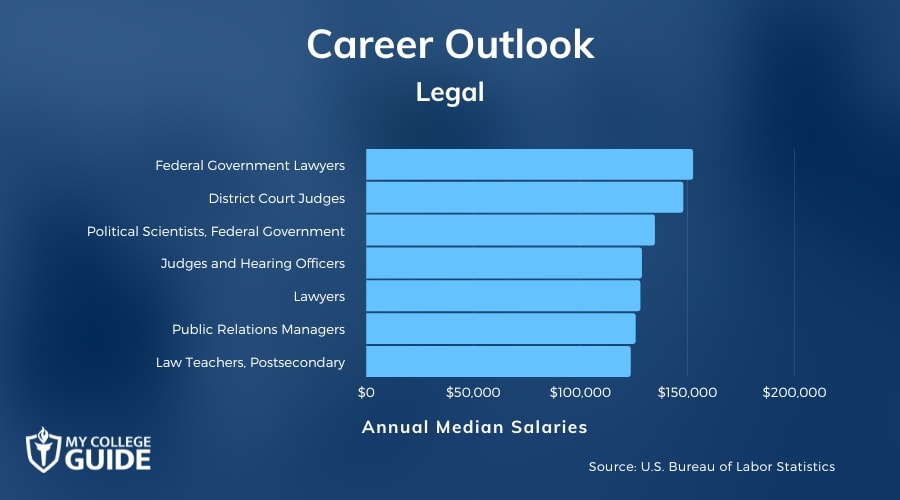When considering law careers and working in the field of law, it requires a great deal of dedication and education in order to be successful.

For motivated students that have a passion for justice, earning a law degree can give you the opportunity to make a difference on the local, state, or federal level.
Editorial Listing ShortCode:
Whether you are working as an attorney or presiding over cases as a judge, a law degree is an essential component for entry into these challenging, fast-paced careers.
What Can You Do With a Law Degree?

The various careers with a law degree can lead to lucrative employment opportunities that involve a number of different industries.
If you want to work one-on-one with various clients and help them overcome their legal troubles then becoming a lawyer or mediator may be a good path for you. With work experience and further education, you can also work toward becoming a judge.
Editorial Listing ShortCode:
If you prefer to use your law degree away from legal careers, you can explore non-legal options like becoming a political scientist or private detective. If you have a passion for the law and teaching, consider becoming a law teacher.
When wondering what can I do with a law degree, it may surprise you to know there are legal careers and non-legal careers you can pursue with a law degree.
10 Things You Can Do with a Degree in Law

A law education can prepare you for many fulfilling law professions and careers after law school within and beyond private practice.
Here are 10 possible career paths in law and related fields and their job outlook over the next 10 years, according to the U.S. Bureau of Labor Statistics (BLS).
Legal Careers
A legal degree can open the door for many enjoyable and often well-paying careers in law.
1. Lawyer

Becoming a lawyer is a popular law career path. Lawyer helps their clients understand and navigate the legal system. They may represent clients in court, file legal documents like lawsuits, and research legal issues. The demand for lawyers will grow by 10% in the next few years.
2. Arbitrator, Mediator, and Conciliator

An arbitrator, mediator, or conciliator helps opposing parties communicate and resolve legal disputes. They evaluate evidence, mediate meetings between disputants, and write settlement agreements. This career path will experience 6% job growth over the next decade.
3. Judge

A judge oversees legal hearings and trials in court. They approve search warrants, hold pretrial hearings, and interpret the law.
A judge may make the final decision on a case or supervise jurors. Demand for judges will decrease slightly by 1% over the next 10 years.
4. Judicial Law Clerk

A judicial law clerk assists a judge with administrative, research, and writing tasks. Typical duties include drafting legal opinions, researching laws and legal issues, and proofreading legal documents. This job will experience 0% growth within the next decade, meaning that the number of opportunities will remain steady.
5. Paralegal and Legal Assistant

Paralegals and legal assistants are sometimes considered entry-level legal jobs and they help lawyers prepare for meetings and trials. They conduct legal research, gather evidence, and write reports for lawyers. They also file legal documents and schedule interviews with witnesses. Demand for these entry-level legal jobs will increase by 14% in the next few years.
Non-legal Careers
If you don’t want to work directly in the legal system, a law degree can help you launch other satisfying careers.
6. Postsecondary Teacher

A law professor teaches college students about the legal field. Common responsibilities include developing syllabi, teaching courses, and grading assignments.
A professor provides academic and career mentoring for students. This job will grow 12% over the next 10 years.
7. Political Scientist

A political scientist researches political issues, systems, and theories, often specializing in areas like international relations or national politics.
Editorial Listing ShortCode:
The government, labor unions, political groups, and universities may employ political scientists. This career will experience a 6% job growth within the decade.
8. Compliance Analyst

A compliance analyst ensures that individuals and organizations comply with laws and regulations. They can evaluate licenses and permits, inspect an organization’s internal operations, and help clients resolve compliance issues. This career will grow by 4% over the next 10 years.
9. Librarian and Library Media Specialist

A law librarian or library media specialist helps law students, lawyers, and other specialists research legal issues. They maintain and expand collections of legal materials, help patrons locate information, and oversee library staff. Demand for all librarians and library media specialists will increase by 6% in the next few years.
10. Private Detective

A private detective investigates legal and personal problems. Their duties may include conducting surveillance, researching court and public records, and gathering evidence for clients.
A private detective must understand and comply with all relevant laws. This job will grow by 6% over the next decade. A versatile law degree can prepare you for many fascinating jobs in law and other disciplines.
Different Types of Law Degrees

Online programs can offer several law degrees with varying time commitments and requirements, including:
- Juris Doctor (JD Degree): This professional degree gives you the knowledge and skills needed to practice law. You’ll study legal topics and theories, like constitutional law and civil procedure. After you finish your JD, you’ll typically need to sit for the bar exam before becoming a practicing lawyer. Most full-time students complete their JD in three years, but some colleges offer accelerated programs.
- Master of Laws (LLM Degree): Practicing lawyers can complete an LLM to develop expertise in a particular field of law. Popular areas of specialization include intellectual property, human rights law, and tax law. Most lawyers return to school for their LLM after practicing for several years. This degree generally takes one year to complete with full-time enrollment.
- Master of Dispute Resolution (MDR Degree): This graduate degree prepares you for a career as a mediator or conciliator. Many non-legal professionals complete an MDR to mediate disputes in their discipline, such as engineers and human resource specialists. An MDR degree usually takes two years to complete if enrolled full-time.
- Master of Legal Studies (MLS Degree): This graduate degree allows people who aren’t practicing lawyers to learn about legal matters that affect their job. Compliance officers, health services managers, labor relations specialists, and other legal-adjacent professionals may benefit from an MLS degree. This degree often takes two to four years to complete, depending on how many classes you take each semester.
- Doctor of Juridical Science (SJD Degree): This terminal degree prepares you for a career as a law professor or scholar. Many SJD students have already completed a JD and LLM. This degree isn’t necessary to practice or teach law, but it may help you secure a position as a tenured professor at an elite university. An SJD program typically requires two years of full-time coursework and a dissertation.
Your personal and professional goals can help you determine which educational path best suits you.
Legal Careers & Salaries

There are several types of legal degree careers available, and in the table below we have highlighted a list of the top 40 law careers & salaries according to the U.S. Bureau of Labor Statistics (BLS).
By looking through the following career ideas, we hope you will gain a better understanding of the different paths that may be available to you after graduating from a law degree program:
| Careers | Annual Median Salaries |
| Federal Government Lawyers | $152,590 |
| District Court Judges | $148,030 |
| Political Scientists, Federal Government | $134,760 |
| Judges and Hearing Officers | $128,710 |
| Lawyers | $127,990 |
| Public Relations Managers | $125,780 |
| Law Teachers, Postsecondary | $123,470 |
| Political Scientists | $122,510 |
| Hearing Examiners | $102,550 |
| Fundraising Managers | $100,810 |
| Political Scientists, Professional, Scientific, and Technical Services | $99,640 |
| Sociologists | $92,910 |
| Political Science Teachers, Postsecondary | $81,980 |
| Social Scientists and Related Workers | $80,890 |
| Urban and Regional Planners | $78,500 |
| Social Science Professors | $77,500 |
| Library Science Teachers, Postsecondary | $77,100 |
| Compliance Investigators | $71,650 |
| Writers and Authors | $69,510 |
| Historians | $63,940 |
| Market Research Analysts | $63,920 |
| Editors | $63,350 |
| Lobbyists | $62,800 |
| Librarians and Media Collections Specialists | $61,190 |
| Fundraisers | $60,660 |
| Court Reporters | $60,380 |
| Paralegal Instructors | $59,840 |
| Legal Technicians | $59,790 |
| Survey Researchers | $59,740 |
| Private Investigators | $59,380 |
| Paralegals | $56,230 |
| Judicial Clerks | $50,750 |
| Political Science Research Assistants | $49,720 |
| Arbitrators, Mediators, and Conciliators | $49,410 |
| Legal Administrative Assistants | $47,710 |
| Deputy Court Clerks | $44,610 |
| Legal Transcriptionists | $44,030 |
| Correspondence Representatives | $37,920 |
| Notary Publics | $37,900 |
| Census Clerks | $37,220 |
Whether you plan on working as an attorney or as a legal assistant, the law career outlook continues to show an upward trend. According to data provided by the BLS, lawyers are expected to see occupational growth of 10% over the next 10 years.
Editorial Listing ShortCode:
Additionally, paralegals and legal assistants will see a 14% growth in the same timeframe. These steady growth numbers are good news for those interested in earning a law degree and will result in the consistent addition of new jobs within the industry.
You can also view our Journalism Careers and Liberal Arts Careers guides for more options.
Law Licensure and Certifications

Licensing for legal professionals varies by state, but there are a few standard law licenses. To become a practicing lawyer, you must sit for the bar exam after receiving your JD.
48 states use the Multistate Bar Examination (MBE), a six-hour test. You may also be required to complete an essay examination and a test on state laws. The American Bar Association (ABA) accredits 18 lawyer specialty certification programs hosted by eight private organizations. You can complete a specialty certificate in complex litigation, elder law, privacy law, and other areas.
Is Financial Aid Available?

A law degree can be costly, but you may qualify for financial aid to help you pay for your degree. You can start your research by completing the Free Application for Federal Student Aid (FAFSA). This application can determine your eligibility for federal grants, student loans, work-study programs, and other financial aid resources.
Many law schools offer merit- and need-based financial aid for qualifying students. Your current employer may also provide tuition assistance or reimbursement.
What Is a Law Degree?

A law degree is a field of study that focuses on law and prepares students for a legal career. A few of the topics that you can expect to cover during the course of your law degree program include:
- Criminal law
- Civil procedure
- International law
- Legal research
- Business law
- Family law
A Juris Doctor (J.D.) degree can be pursued after successfully completing a bachelor’s degree program, and it typically takes three full years to complete. In the later years of your J.D. program, you may have the opportunity to specialize within a degree concentration to learn advanced skills in your field of interest.
For those who want to work directly with clients in the courtroom setting, working towards your J.D. A law degree is an excellent starting point to begin building your professional career.
Are there Law Degrees Available Online?

The vast majority of states require that students graduate from an ABA-accredited school of law in order to sit for the mandatory bar examination before working as an attorney. However, depending don’t the state where you’d like to practice law, there are additional educational requirements.
Editorial Listing ShortCode:
The ABA has started approving and accepting credits from various online law schools. It’s best to check the ABA’s website to ensure your online school is on its list of approved choices. It is important to note, however, that if you have any intention of relocating or practicing outside of your chosen state, your education will likely not be recognized in a new state.
What Are the Different Types of Lawyers?

Law is a vast and diverse field that offers many exciting career paths for lawyers, such as:
- Corporate Lawyer: This expert provides legal advice for business executives and represents corporations during lawsuits and other legal proceedings.
- Family Lawyer: This specialist represents clients during divorce proceedings, child custody battles, and other family-related hearings.
- Immigration Lawyer: This professional helps clients apply for asylum and secure green cards and other citizenship documents.
- Personal Injury Lawyer: This lawyer helps injured clients receive compensation from companies, insurance corporations, and other entities.
You can pick a lawyer career that aligns with your goals and passions.
What Are the Highest Paid Lawyers?

Many lawyers earn lucrative salaries, especially after they acquire years of work experience. According to the BLS, Scientific Research and Development Services is among one of the highest-paid industries for lawyers. You can also opt to be a lawyer for the federal government.
Alternatively, if you’d like to work directly with businesses, you could opt to be a lawyer in the management of companies and enterprises with a lucrative annual salary. Other top-paying lawyer positions include medical layers, intellectual property lawyers, tax attorneys, corporate lawyers, and trial attorneys.
Salaries vary based on factors like location, employer, and experience. Specializing in an area of law could increase your earning potential.
Is a Law Degree Worth It?

Yes, a law degree is worth it for many professionals. According to the BLS, many legal careers will experience positive job growth in the next ten years.
Paralegals are expected to see a 14% job growth over the next decade, while lawyers will see a 10% job growth. For non-legal careers, political scientists are expected to see a 6% growth over the same time period. You may find a career in this field rewarding if you want to work in an in-demand and often well-compensated role.
Editorial Listing ShortCode:
A law degree can also help you pursue a range of careers beyond the legal field. For example, you could support law students as a librarian or professor or help organizations follow the law as a compliance officer.
Getting Your Law Degree Online

A law degree can be the first step to a fulfilling career as a lawyer or another role. You’ll study challenging and fascinating topics like criminal law, medical malpractice law, and torts. These courses will allow you to gain in-depth knowledge of laws and legal theories.
An online law program can offer you convenience and flexibility as you complete your degree. You can take courses at your own pace and enroll full-time or part-time, depending on your schedule.
If you’re ready to kickstart or advance your legal education, you can start today by researching accredited online programs.
